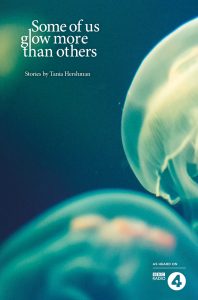You have no items in your cart. Want to get some nice things?
Go shoppingIn her latest collection of short stories, Some of us glow more than others, Tania Hershman creates a world in which science and love collide with glassy perfection. War and loneliness shimmer poetically through the petri-dishes and green fluorescent protein, and science with its lovely gadgetry, specimens and syntax; its labs full of lonely researchers, wins hands down every time.
The forty-odd stories comprising this collection are constructed with great care, their subjects plausible, original, and deftly revealed. In ‘God Glows’, Hershman pits science against religion; a playful account of a nun who postulates that love can be traced in the blood. When her experiments don’t go according to plan, she seeks advice from a biochemist friend, whose heart has recently been mangled by someone he met at a conference. ‘Fuck science,’ he writes, ‘fuck scientific enquiry.’ To which the nun responds: ‘I am a nun,’ and continues her experiments.
Hershman inhabits places we’d rather avoid. In ‘The Special Advisor’, a man falls witlessly into a job adjudicating executions. ‘War Games’ turns its eye to children in combat, exploring the horrors and ironies of war. Mechanical dystopic futures unfold in ‘And What If All Your Blood Ran Cold’ and ‘The Perfect Egg’, while ‘Octopus’s Garden’, one of the highlights of the collection, has all the hallmarks of a fairy story – a gruesome task, underworld gloaming, a woman who: ‘stands naked by her window, holding her wetsuit like a second skin’ – and an ending which surprises, rising aptly and luminously from the text. In ‘There Is No-One In the Lab Tonight But Mice’, art is pitted against science, with art found decidedly wanting.
Intellectual speculation abounds. Possibilities are taken to their conclusion. Hershman’s genius lays with her ability to prize open the ordinary: moles, flavours, video-games, gasometers, flipping our vision until objects stare right back, transformed, gorgeous, broken, and wanting. In ‘What Is It That Fills Us’, gasometers have feelings. Love is whispered, ‘it rustled, shifted, so that she never spoke to the same molecule twice.’ ‘The House of Meat’ turns scientific enquiry on its head, with the pre-meat specimen at the centre of the story craving attention as Post Docs collide emptily around it, seeking sex, intimacy, and recognition.
Hershman is a moral writer. Themes of alienation, violence and loneliness abound; yet, unlike the molecules bonding and glowing on petri-dishes, few characters connect beyond the most menial of encounters. They remain adrift and disconnected as the characters in MacNeice’s poem, which frames the collection.
For writers, there is much to be learnt about the craft from Hershman; her ability to convincingly and effortlessly construct a unique world, often in less than a few hundred words. Characters are drawn with steely brevity: ‘eyes like seaweed strangling a newborn, a smile like an animal trapped under thin ice…’
As a reader, it’s impossible not to admire her skills, be startled by her insights, even laugh on occasion, but at the end of it, what I really craved was a little more warmth. ‘You do not know how this will end,’ one character says to another at the end of ‘The Special Advisor’, which could be an apt reflection on the stories within – ideas spark and clash, sparse as x-rays glowing in the dark, requiring the reader to flesh out the substance, to take what they will from each offering.
Some of us glow more than others is published by Unthank Books.

About Christina Sanders
Chris Sanders has been writing short stories for over ten years. She has been published in: Writing Women, Quality Women’s Fiction, Peninsular and TQF. In 2011 she won an Arts Council bursary to appraise her first novel, and has contributed to various Arts Council writing projects. At present she is working to complete a collection of short stories on the theme of ‘Compromise.’ Chris Sanders holds a Masters in Education, and is currently working with women from BME communities in Hastings to use storytelling as a way to explore identity and heritage.






One comment